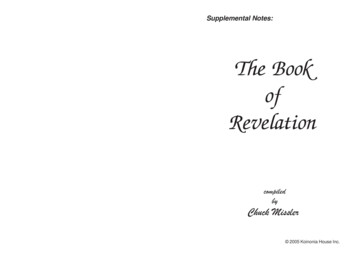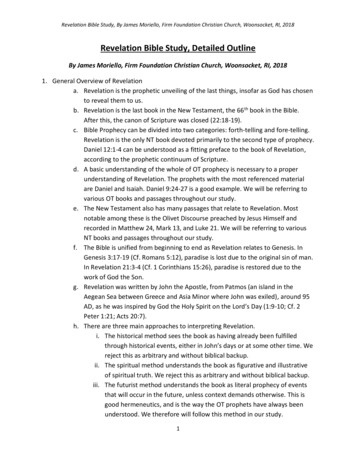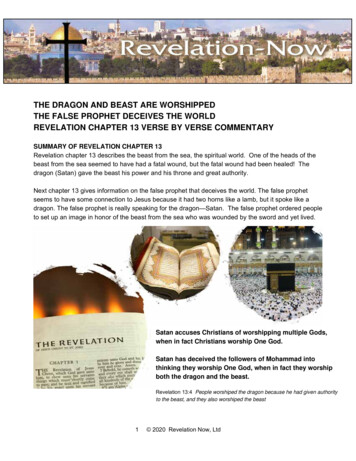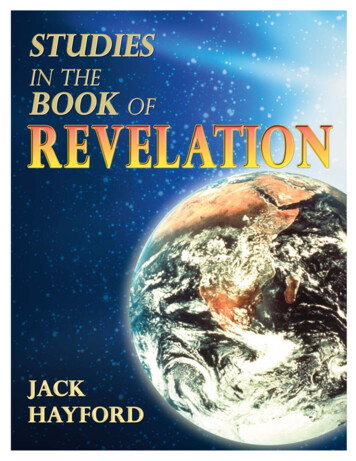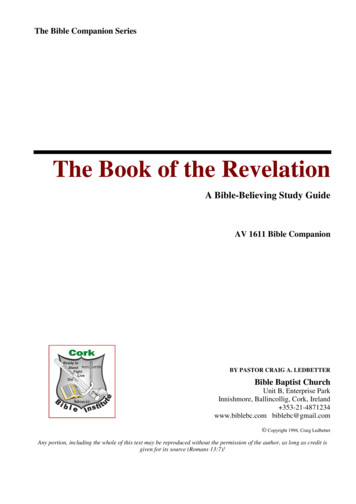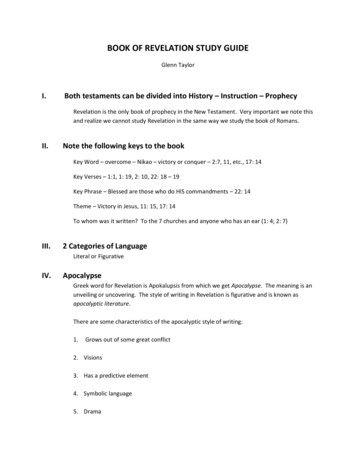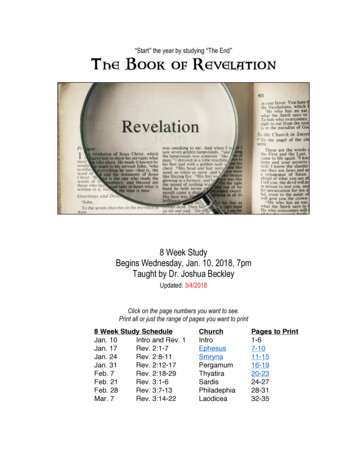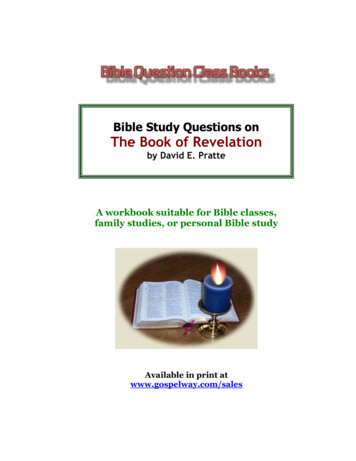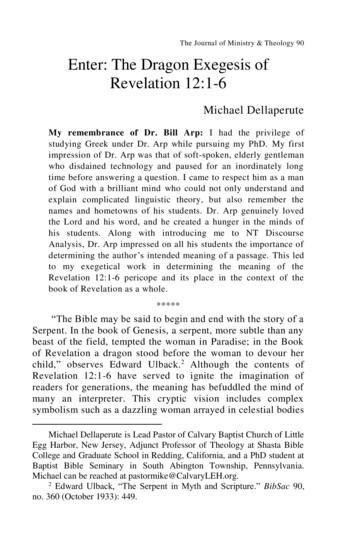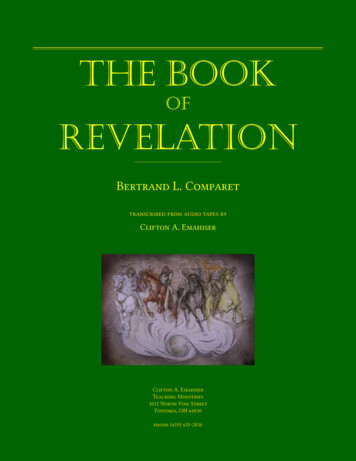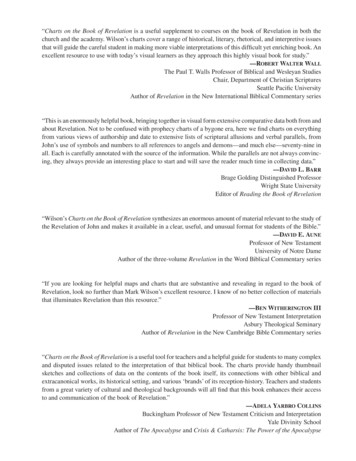
Transcription
The Book Of TheRevelation"Strength for today andbright hope for tomorrow"with Pastor David Legge
THE BOOK OF THE REVELATIONPastor David LeggeDavid Legge is a Christian evangelist, preacher and Bibleteacher. He served as Assistant Pastor at PortadownBaptist Church before receiving a call to the pastorate ofthe Iron Hall Assembly in Belfast, Northern Ireland. Heministered as pastor-teacher of the Iron Hall from 19982008, and now resides in Portadown with his wifeBarbara, daughter Lydia and son Noah.Contents1. Introduction To Revelation - 12. The Greeting To The Seven Churches - 143. The Vision Of The Glorified Lord – 254. Ephesus, The Loveless Church - 355. Smyrna, The Persecuted Church - 466. Pergamos, The Compromising Church - 577. Thyatira, The Corrupt Church - 688. Sardis, The Dead Church - 809. Philadelphia, The Faithful Church - 9010. Laodicea, The Lukewarm Church – 10111. The Throne Of God - 11212. The Lamb And The Scroll - 12313. The Seven Seals - 13314. The Seven Trumpets - 14315. The Seven Key Characters - 15516. The Seven Bowl Judgements - 16617. The Seven Dooms On Babylon - 17718. The Return Of Jesus Christ - 18719. The Millennial Reign Of Christ - 19920. The Seven New Things - 211The audio for this series is available free of charge either on our website(www.preachtheword.com) or by request from info@preachtheword.comAll material by Pastor Legge is copyrighted. However, these materials may be freely copied and distributed unaltered for thepurpose of study and teaching, so long as they are made available to others free of charge, and the copyright is included. Thisdoes not include hosting or broadcasting the materials on another website, however linking to the resources onpreachtheword.com is permitted. These materials may not, in any manner, be sold or used to solicit "donations" from others, normay they be included in anything you intend to copyright, sell, or offer for a fee. This copyright is exercised to keep thesematerials freely available to all.2
THE BOOK OF THE REVELATIONPastor David LeggeThe Book Of The Revelation - Chapter 1" Introduction To Revelation"Copyright 2007by Pastor David LeggeNAll rights reservedow turn with me to Revelation and chapter 1, and I think we'll read the first 9 verses although we'll only really be looking at the first three tonight, and not in much detail.Tonight will really serve as an introduction to this book of 22 chapters, and there reallyis enough information in each verse to keep us there a week a verse - but we can't do that!But it will be slower to start with, and then hopefully we might be able, as we go through thisseries, to deal maybe with a chapter a night, at least on some occasions. But we'll start slow,so that we lay a good foundation that will help us in understanding the rest of this book in theweeks that lie ahead.So let's begin at verse 1 of chapter 1, through to verse 8: "The Revelation of Jesus Christ,which God gave unto him, to shew unto his servants things which must shortly come to pass;and he sent and signified it by his angel unto his servant John: Who bare record of the wordof God, and of the testimony of Jesus Christ, and of all things that he saw. Blessed is he thatreadeth, and they that hear the words of this prophecy, and keep those things which arewritten therein: for the time is at hand. John to the seven churches which are in Asia: Gracebe unto you, and peace, from him which is, and which was, and which is to come; and fromthe seven Spirits which are before his throne; And from Jesus Christ, who is the faithfulwitness, and the first begotten of the dead, and the prince of the kings of the earth. Unto himthat loved us, and washed us from our sins in his own blood, And hath made us kings andpriests unto God and his Father; to him be glory and dominion for ever and ever. Amen.Behold, he cometh with clouds; and every eye shall see him, and they also which pierced him:and all kindreds of the earth shall wail because of him. Even so, Amen. I am Alpha andOmega, the beginning and the ending, saith the Lord, which is, and which was, and which isto come, the Almighty".Now, the first thing we want to deal with tonight is the title of this book. Like most of theBiblical books, we have within the first verse the title. Now, it depends what version of theBible you're reading tonight, but most of you, I'm sure, will have the Authorised Version, andthe title given in it, or most editions of the Authorised, is incorrect. It says that it is 'TheRevelation of John', it is not the Revelation of John. It is, as you see from verse 1, 'TheRevelation of Jesus Christ'. Now that is very important. Now it could mean 'the Revelationabout Jesus Christ', or it could mean 'the Revelation that came from Jesus Christ'. In myopinion it could be both, and the first is correct, that this is 'the Revelation about Jesus Christ'- and if this last book of the Bible is about anything, it's about the Son of God.Now the Gospels, Matthew, Mark, Luke and John, revealed the humiliation of the Lord JesusChrist - and it's important to understand that: that the four Gospels were fulfilling propheticScriptures in the Old Testament. But prophetic Scriptures in the Old Testament are often seento be quite jumbled up concerning the first coming of the Lord Jesus into this world toBethlehem, to be the humble Servant of the Lord, to go to the cross and die for sins, riseagain the third day, and ascend unto heaven - that's what they encapsulate, the humiliationand condescension of the Lord Jesus. Yet so many other Old Testament Scriptures speak ofhow Messiah would come as a King, would set up an earthly kingdom, and would rule with a3
THE BOOK OF THE REVELATIONPastor David Leggereign of righteousness. So this book is a revelation of Jesus Christ, not in the sense thatMatthew, Mark, Luke and John revealed Him, but rather than the humiliated Christ, we havein Revelation an unveiling for us of the exalted and glorified Jesus Christ. All the events of thisbook centre around visions and symbols of the resurrected Christ, who alone has authority tojudge the earth, eventually to remake the earth, and then to rule over the earth inrighteousness. So many people get caught up with the intricate details concerning futureevents, that they miss the point that the Lord Jesus Christ is the chief subject of this book. Ifyou miss Him, you've missed everything.Now look with me very, very quickly at chapters 1 to 3 - we see Christ as the exalted PriestKing in the midst of His churches. We will look at that in more detail in weeks to come chapter 2 and chapter 3 in particular - Christ is in the midst, ministering to His church. Then ifyou look quickly at chapters 4 and 5, we see Christ as the glorified Lamb in the midst of thethrone, Christ is in the midst reigning. Then chapters 6 through to 18, a few more chapters,we see Christ as the Lion in the midst of the nations of the world, Christ in the midst judging.Then in chapter 19 we see Christ as the conquering King of Kings, and Christ comes into themidst returning. In chapter 20 we see Christ as the Heavenly Bridegroom in the midst of themarriage supper, and Christ is in the midst of His people rejoicing with them and over Hisnew-found bride and wife, the church. Then in chapter 21 and 22, the last two chapters of thebook, Christ is the light in the midst of eternal glory, Christ in the midst of the holy city, theNew Jerusalem, shining.I hope you can see that it's all about Jesus Christ. Someone put it well: 'He is the arbiter ofthe destinies of the church and of the world'. Whatever we find in these Monday nights in thebook of the Revelation, we better find Christ, because this is the revelation about JesusChrist! As the line of that hymn says: 'Beyond the sacred page, I seek Thee Lord'. What haveyou come here for tonight? It's great to see you, but so many people are tantalised byprophecy. Sometimes I wonder, whilst I think we should be excited by it, is it at times thesame excitement as a pagan has when they get someone to look into their tea leaves or acrystal ball? It's got to be more than that. I think of Charles Haddon Spurgeon's hymn, whichwas written, of course, in relation to the Lord's Supper, but it's so applicable to the secondcoming truth:'If now with eyes defiled and dim,We see the signs, but see not Him;O may His love the scales displace,And bid us see Him face to face'.Don't get caught up with the signs of the times tonight and miss that this is the revelation ofJesus Christ, the Son of God, it's all about Him! It's His love that will cause the scales todisplace from off our eyes, and we will see Him beyond the sacred page. If you thinkknowledge is the most important aspect to interpreting the book of the Revelation, you'rewrong, it is love: love for the Lord, love for His word, love for His people. May I remind you inour introduction of 1 Corinthians 13:2: 'Though I have the gift of prophecy', Paul says, 'andunderstand all mysteries, and all knowledge; and though I have all faith, so that I couldremove mountains, and have not charity', love, 'I am nothing'. Christ is the love of God to ourhearts, let's not miss Him.This is the Revelation about Jesus Christ, but the second understanding of this title, 'TheRevelation that came from Jesus Christ', is equally authentic. If you look at verse 1, you willsee that this revelation 'God gave unto him' - and that 'h' there of 'him', really should be a4
THE BOOK OF THE REVELATIONPastor David Leggecapital, because it's not speaking of John, it's speaking of Christ. God gave this revelation toChrist, 'to shew unto his servants things which must shortly come to pass; and he sent', Godsent, 'and signified it by his angel unto his servant John'. Now follow with me the processhere: God gave this revelation to Jesus Christ about His future, how He would be glorified,how the history of mankind would come to consummation in God's eternal plan. God sent thatmessage by Christ, through an angel, to the apostle John. Now sometimes in the book John isspoken to by the Lord Jesus Himself, and other times an elder speaks to John. There aretimes we see a voice from heaven speaking to him, but the process of the delivery of thisrevelation was from God, given to Jesus Christ, sent by Christ by an angel to the apostle.Now that's the title of the book: about Christ, from Christ. Let's look for a moment at therecipients of this revelation. Verse 1, right in the middle says 'to shew his servants thingswhich must shortly', or quickly, or swiftly take place. Now right away that designates thisbook as being prophetic. It is speaking of things that as yet have not happened, but wouldcome to pass. As we know from the last two chapters, chapter 21 and 22, that goes right untilthe eternal state, after Christ has returned, reigned for a thousand years, and set up aneternal Kingdom forever - so there's a lot of prophecy in this book.Now let's look at the author, at the end of verse 1 he is designated as John. Now we believethat this is indeed John the apostle, the same John that wrote the 1st, 2nd and 3rd epistles ofJohn, and of course the wonderful Gospel of John - four times within this book the writeridentifies himself as John. Now some have cast doubt upon the fact that this is John theapostle, but the early church tradition was in unanimous agreement that this indeed was Johnthe great apostle - who, of course, ministered many many years in the church of Ephesus,one of the churches of Asia which he writes to here. In verse 2 we read of John'scircumstances as he authors the book, 'Who bare record of the word of God, and of thetestimony of Jesus Christ, and of all things that he saw'. In verse 9 he elaborate on hiscircumstances, 'I John, who also am your brother, and companion in tribulation, and in thekingdom and patience of Jesus Christ, was in the isle that is called Patmos, for the word ofGod, and for the testimony of Jesus Christ'.John, the author, wrote this book from a vision he received on the Isle of Patmos, and thebook was probably written in the late first century, around the 90s AD, which were the latteryears of the reign of the Roman Emperor, Domitian. Now that's important, it's important aswe'll see a little bit later, the message that this book conveys to these Christians and toourselves today - to know that John himself was exiled as a persecuted Christian to the Isle ofPatmos, and John, when on the Isle of Patmos, receives a vision to give and write topersecuted Christians in seven churches in Asia Minor, which is modern-day Turkey.Titus Flavius Domitian, this Roman Emperor, reigned when the empire was making greatbloodthirsty strides. By this stage they had touched parts of Germany and, believe it or not,Great Britain. Domitian demanded of every member of the empire that they should worshiphim as Lord and God, and if you refused to do it you were severely persecuted - and traditiontells us that Domitian sent John to the Isle of Patmos, and condemned him to work in mineson that island which was a Roman penal colony off the coast of Asia Minor in the GreekAegean Sea. There is a map of it on the screen, and you may be able to see the Isle ofPatmos there. I just wonder was that one of the reasons why we find the word 'sea' 26 timesin the book of the Revelation? John saw an awful lot of it! There is another picture of it - quiteidyllic looking, I don't think it was as nice for John, but there we have it: that's where he was.Now in verse 3, I want you to note something else. We've seen the title, the recipient, the5
THE BOOK OF THE REVELATIONPastor David Leggeauthor, and this book begins with a benediction in verse 3: 'Blessed is he that readeth, andthey that hear the words of this prophecy, and keep those things which are written therein:for the time is at hand'. Now this benediction is, I believe, the motivation for studying thebook of the Revelation. Now I will talk a little bit later about my own motivation for beginningthis series, but this is a book with a blessing - and indeed it is the only book that isdesignated in such a way in the whole Bible. I'm not saying the others aren't blessed, ofcourse they are, and you will accrue a blessing through reading them! But this is the onlybook that begins with this pronounced blessing upon those who read it, hear it and obey it;and ends, incidentally, in chapter 22, with another blessing upon those who imbibe it.Incidentally, there are seven 'beatitude', blessings pronounced in the book of the Revelation.We've just read the first in chapter 1 verse 3, turn with me to the rest. The second is found inchapter 14 verse 13, speaking of martyrs during the tribulation period here on the earth, inchapter 14 verse 13 John says: 'I heard a voice from heaven saying unto me, Write, Blessedare the dead which die in the Lord from henceforth' - those martyred for the cause of the LordJesus are blessed. Chapter 16 and verse 15, we read there: 'Behold, I come as a thief', Jesussays, 'Blessed is he that watcheth, and keepeth his garments, lest he walk naked, and theysee his shame' - those who are faithful until the coming of the Lord Jesus are blessed. Thenturn with me to chapter 19 and verse 9, the marriage supper of the Lamb when the LordJesus will be united with His church, 'He saith unto me, Write, Blessed are they which arecalled unto the marriage supper of the Lamb'. Then in chapter 20 and verse 6, we read:'Blessed and holy is he that hath part in the first resurrection: on such the second death hathno power, but they shall be priests of God and of Christ, and shall reign with him a thousandyears' - those who rise when Christ raptures His church are blessed. Chapter 22 verse 7Jesus, speaking of how He will come: 'Behold, I come quickly: blessed is he that keepeth thesayings of the prophecy of this book'. Chapter 22 and verse 14, the ending blessing: 'Blessedare they that do his commandments, that they may have right to the tree of life, and mayenter in through the gates into the city'.Seven, and you will encounter over these weeks the number seven and again and again - it isthe number, biblically, of completion, of perfection and fulfilment. There is a completeblessing, chapter 1 verse 3 says, to those who read this book, who hear this book, and obeythis book. Now I don't know about you, but I need a blessing! Am I the only one? Do youneed a blessing? I think we all do! We need it every day! We need to count the blessings wehave, surely, but we ought to be seeking more - so let's make these studies the blessings thatthey ought to be to us, that's what God wants, that's what I want, that's what you shoulddesire - and make sure they don't become a curse!Now please note in this verse 3, this benediction, it says: 'Blessed is he that readeth'. Now'he', obviously, is in the singular. Now follow with me: 'Blessed is he that readeth, and theythat hear the words of this prophecy', now 'they' is in the plural. Now that's important: the'he' is in the singular, and it insinuates that the person here who is reading is reading aloud.This isn't reading in your bedroom or in your study, and then the 'they' insinuates that theperson reading aloud is listened to by a plural people. The hearing there is not in the physicalsense, but in the responsive sense - that they are not just listening, but they are doers of theword - they are listening with responsive hearts of faith.Now that is very significant, because the practice in the synagogue - we know this from Luke'sgospel chapter 4 and other portions of Scripture in Acts - the practice was that there wassomeone got up, a man, and read the Scriptures, and everyone listened. They couldn't haveTorahs, laws, for everybody to have, like you have Bibles this evening, so one read and the6
THE BOOK OF THE REVELATIONPastor David Leggerest listened. It was the same, we believe, in the early church, in 1 Timothy 4 and verse 13Paul told Timothy: 'Give attention to reading' - now that was the public reading of thescriptures in the assembly. They didn't have Bibles the way we have, a copy each.Why am I telling you that? Because there has already been a tremendous blessing to me, asthe one who is reading and expounding this book. I'm blessed, and I'm going to be furtherblessed over these weeks - but you should be blessed by listening, but oh to God that youwould listen with responsive hearts, and then it could be said of you that you're not onlyblessed because you're reading too and you're listening, but you are doing, you are obeyingthis word. So this book is intended for public proclamation rather than a mere personalperusal, but it is intended to be kept - who of us will keep the sayings of this book? What alesson! We could spend all night on this one alone: the most blessed will be the most obedient- that runs right through the whole of Christian experience. Trust and obey, for there is noother way to be happy in Jesus, but to trust and obey. May you know that blessing.Then we see in this blessing at the end, we are to 'keep those things which are writtentherein: for the time is at hand'. Now the word for 'time' there in the original Greek thatRevelation was written in, is the word for an 'epoch', or an era, a season of time in history.But he is saying that this time, this epoch is at hand. John is telling us that the great epoch,the next great epoch in God's redemptive history is imminent, it is at hand. Now the word'imminent' is very important in Biblical prophecy, it means 'impending', something that isabout to take place without delay. Now the word 'imminent' is different than 'immediate'.'Immediate' is something that is going to happen there and then, but the second coming ofthe Lord Jesus, as it is portrayed within the whole of the Bible, tells us that we can expect itat any time - and yet 2000 years have passed and it still could be at any moment, because itis at hand, it's imminent not immediate.Now whatever persuasion you are prophetically and theologically when it comes to prophecy,surely you have to agree that the coming of the Lord is at hand? I can almost hear thefootfall, the hymn says, on the threshold of the door. Now, let me challenge you before I goon any further: there may be those among us who are not Christians, have never been bornagain; there may be those who are cold in their faith, backsliders; even believers need tostudy this book to get blessed, and it is my prayer that in the subsequent weeks you will beable to say:'I am waiting for the comingOf the Christ who died for me,O His words have thrilled my spirit,'I will come again for thee'.I can almost hear the footfall,On the threshold of the door,And my heart, my heart is longingTo be with Him evermore'.Is it? Will you be with Him evermore? Well, let's move on. For an introduction I want to giveyou four points tonight. The first is: my motivation for studying this book. The second is: themystery that is often perceived in this book. The third is: the methods of interpreting thisbook. The fourth is: the message of the book.My motivation for studying this book, if I can be personal for a moment or two. A number of7
THE BOOK OF THE REVELATIONPastor David Leggepeople for some time have encouraged me to take on this subject, but that was never enoughfor me! Of course we need the leading of God in all these things, but during the summerrecess I had occasion to be at one Bible Conference in our land, and heard of another onewhere the amillennial interpretation of Bible prophecy was advocated. If you don't understandwhat that means, just let it go by, you will by the end of the meeting. My problem was notwith people holding this, I respect those who hold it, and some of you here tonight hold it. Butthis was delivered to what was essentially, in the right sense, an ecumenical gathering wherepeople from different denominations were, and different theological persuasions - it wasdelivered as a standard, and what seemed to come across as the most credible interpretationof biblical prophecy. Now that disturbed me, and the more I thought about it, it was obviousto me that these speakers - good men and godly men that they were - obviously assumedthat it was safe to teach this without being challenged. I wondered why that was, and I cameto the conclusion that the reason is: prophetic truth of the pre-millennial return of the LordJesus that we will be expounding throughout this series has largely been lost to the church ofthe United Kingdom. So I felt compelled, and indeed stirred up, to present what we believe tobe the only biblically credible interpretation of prophecy in this exposition of the book of theRevelation.Now, that said, let me add a caveat to it: it is essential to distinguish in Christian doctrinefundamentals, fundamental issues, from issues that are important but not fundamental. Nowlisten carefully to this, because this will stand you in good stead for a lot of doctrinal disputes:it's important to distinguish between fundamental issues and important issues that are notfundamental. Now what do I mean by that? Well, what I mean is: the fundamental nonnegotiable truth in prophecy is, Jesus is coming again! Anyone who denies that has denied afundamental, and has put themselves beyond the pale of Christianity. You've got tounderstand that. But though that is the fundamental, how we understand prophetic scripture,and how Jesus will return again, is not a fundamental - and that's why we need much graceand love when we deal with a subject like this. There's much heat rather than light when itcomes to prophetic preaching and teaching these days.But though it is not a fundamental, let it be said that it is important. You see, there arefundamental issues, there are important but not fundamental issues, and then there arenonessentials which really aren't that important - but the teaching of prophetic truth and howwe understand it is not a non-essential, it is something that is important because it hasramifications in other directions, not least how you interpret the Bible in many places. Sowhat we are saying tonight is: we need much grace and love, because whether we are of aparticular prophetic persuasion, though it is not all-important, it is important. That's why I'mstirred to teach it, and it's also the reason why many shy away from it.So my second point is the mystery that is perceived in the book, some people are afraid ofthe book of Revelation because they just feel: 'I cannot understand it'. Often because theyfeel they cannot understand it, they believe that no one could. Winston Churchill, PrimeMinister of the United Kingdom and Ireland, once said that to him the former Soviet Unionwas, I quote, 'A riddle wrapped in a mystery inside an enigma' - and to many people that'swhat the book of the Revelation is like! Joseph Scallinger was a 16th century critic, and hecomplimented the reformer John Calvin by saying, I quote, 'He has shown his sense as muchby not commenting on the book of the Revelation, as he had by the manner in which he hadcommented on the other books of the Bible'. Often - and I have to echo this at times - thereis a defeatist attitude when we come to this book. Now it has to be said that no one has allthe answers concerning this book. We cannot be dogmatic on many things that we find withinthis book. But that being said, we must face, all of us, whatever our prophetic persuasion, the8
THE BOOK OF THE REVELATIONPastor David Leggefact that this is the only book in 66 books of the Bible that is called 'a Revelation' - theopposite of a dark concealment! It is revealed!'Apocalypsis', which is the Greek word for 'Revelation', unfortunately today has becomesynonymous with chaos and catastrophe - and a lot of films haven't helped that - but itliterally means 'an unveiling', 'a disclosure', 'a revealing'. Now we find this type of Biblicalliterature in the book of Daniel in the Old Testament, Ezekiel and Zechariah; and the only NewTestament book that is apocalyptic is the book of the Revelation. Now when Daniel finishedinstructing in his apocalyptic book, in chapter 12 of Daniel and verse 4 we read: 'But thou, ODaniel, shut up the words, and seal the book, even to the time of the end'. He was told toclose the book, conceal it; yet when we come to this book of Revelation, chapter 22 if youlook at it and verse 10, John is told after having been given all these visions: 'Seal not thesayings of the prophecy of this book: for the time is at hand'. Why the difference? Both areapocalyptic literature, Daniel was told in the Old Testament 'Conceal it', John is told in theNew Testament 'Reveal it'. Well, the answer is very simple: Calvary, Jesus died for sinners;the Messiah of God, the Son of God, the Saviour of the world, the King of Israel - He wasburied, three days later He rose again, He ascended into heaven forty days later, ten dayslater He sent the Holy Spirit into this world. All of these events, these New Testament gospelevents, ushered in what the Bible calls 'the last days'.We read in Hebrews 1:1-2: 'God, who at sundry times and in divers manners spake in timepast unto the fathers by the prophets, Hath in these last days spoken unto us by his Son,whom he hath appointed heir of all things, by whom also he made the worlds'. He is told inchapter 22 and verse 10, John that is, to reveal this apocalypse because the time is at hand.Now the total significance of this message, though we cannot understand absolutelyeverything contained within it, we must say tonight upon the authority of God's word that thetotal significance and focal message of this apocalypse is plain to the ordinary man andwoman, it has to be if God's word is true. So don't be mystified by it all, whilst there's difficultthings in it, don't be put off - you could put that phone off maybe! - don't be put off by themystery that is in this book!Now, the reason for the misunderstanding of the book is probably due to my third point: themethods, the various different methods of interpretation that are applied to it. Here are four now if you don't have a notebook and pen with you tonight, you need to get one becauseyou'll never remember all these things, or get the CD or tape and study these things again.There are four basic approaches to the book of the Revelation. The first is called the preteristschool or approach. Really the preterist, which means 'past', he interprets Revelation ashaving already been fulfilled in the first century AD in the events after AD 70, which was afterthe destruction of Jerusalem and the Temple, the scattering of the Jews. They say itsymbolises and records the struggle of the Christian church with the Roman Empire of theday, and now that is all past, it's all fulfilled - that's what the preterist says.Now the strength of that particular approach is that it makes the book meaningful to therecipients who received this letter, it meant something to them. But the weaknesses areobvious, because although it might have meant something to them, it doesn't mean anythingto us, it becomes meaningless to subsequent readers, and also there are many parts of it thatare left unfulfilled. What it does is it robs the book of the Revelation of its prophetic natureand it becomes merely historical, and we know that it is a prophecy, as we've seen already.Then secondly there is the historicist school. The historicists really believe that the bookcomprises the unfolding of Church history until the second coming of Christ. Now the strength9
THE BOOK OF THE REVELATIONPastor David Leggeof that view is that it makes it relevant to subsequent ages, and it has a meaning to othergenerations other than the generation to which it was written. It has to be said there aremany parallels between truths in the book of the Revelation and things that have happened inChurch history. The weakness of the historicist view is that though it becomes relevant to us,it becomes therefore irrelevant to the origi
Biblical books, we have within the first verse the title. Now, it depends what version of the Bible you're reading tonight, but most of you, I'm sure, will have the Authorised Version, and the title given in it, or most editions of the Authorised, is incorrect. It says that it is 'The Revelation of
